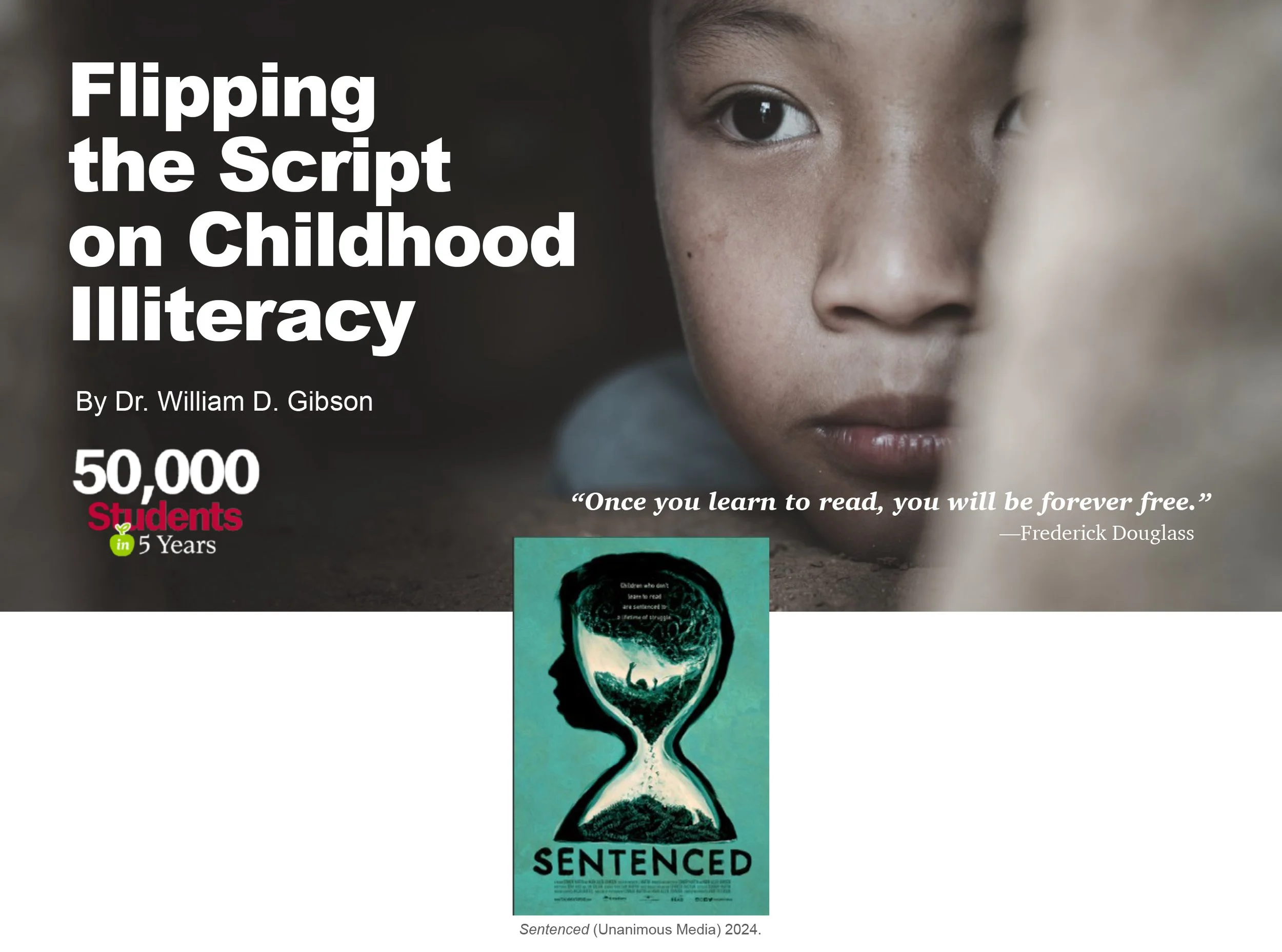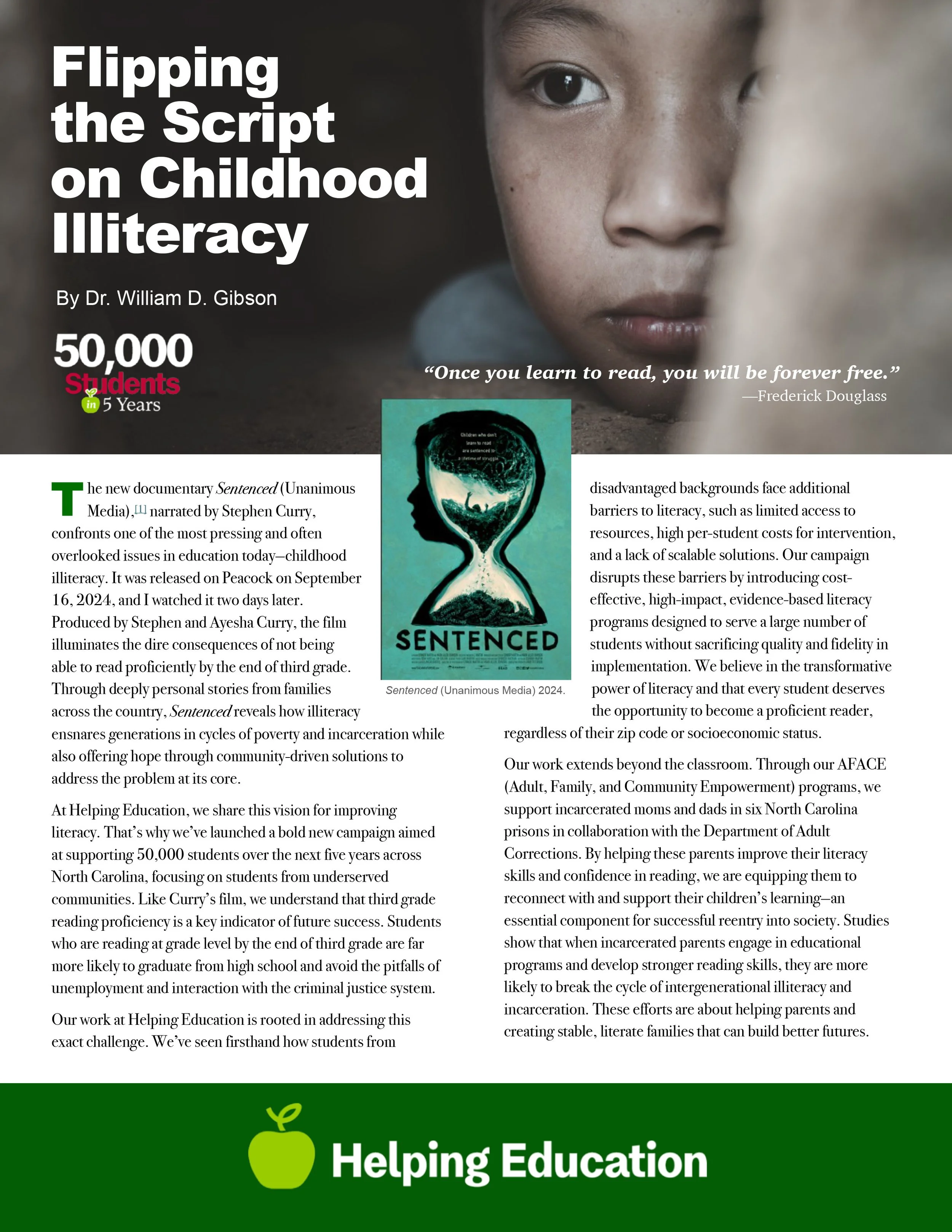Flipping the Script on Childhood Illiteracy
The new documentary Sentenced (Unanimous Media),[1] narrated by Stephen Curry, confronts one of the most pressing and often overlooked issues in education today—childhood illiteracy. It was released on Peacock on September 16, 2024, and I watched it two days later. Produced by Stephen and Ayesha Curry, the film illuminates the dire consequences of not being able to read proficiently by the end of third grade. Through deeply personal stories from families across the country, Sentenced reveals how illiteracy ensnares generations in cycles of poverty and incarceration while also offering hope through community-driven solutions to address the problem at its core.
At Helping Education, we share this vision for improving literacy. That’s why we’ve launched a bold new campaign aimed at supporting 50,000 students over the next five years across North Carolina, focusing on students from underserved communities. Like Curry’s film, we understand that third grade reading proficiency is a key indicator of future success. Students who are reading at grade level by the end of third grade are far more likely to graduate from high school and avoid the pitfalls of unemployment and interaction with the criminal justice system.
Our work at Helping Education is rooted in addressing this exact challenge. We’ve seen firsthand how students from disadvantaged backgrounds face additional barriers to literacy, such as limited access to resources, high per-student costs for intervention, and a lack of scalable solutions. Our campaign disrupts these barriers by introducing cost-effective, high-impact, evidence-based literacy programs designed to serve a large number of students without sacrificing quality and fidelity in implementation. We believe in the transformative power of literacy and that every student deserves the opportunity to become a proficient reader, regardless of their zip code or socioeconomic status.
Our work extends beyond the classroom. Through our AFACE (Adult, Family, and Community Empowerment) programs, we support incarcerated moms and dads in six North Carolina prisons in collaboration with the Department of Adult Corrections. By helping these parents improve their literacy skills and confidence in reading, we are equipping them to reconnect with and support their children’s learning—an essential component for successful reentry into society. Studies show that when incarcerated parents engage in educational programs and develop stronger reading skills, they are more likely to break the cycle of intergenerational illiteracy and incarceration. These efforts are about helping parents and creating stable, literate families that can build better futures.
By aiming to reach 50,000 students in five years, we are setting an audacious goal—but one that we know is achievable with the right strategies and partnerships. We are leveraging innovative approaches that reduce the high per-student cost typically associated with literacy interventions, allowing us to make a greater impact at scale. This means not only helping students improve their reading skills but also addressing the systemic inequities that have historically left them behind. Our programs are specifically designed to reach students in rural and urban underserved communities across North Carolina, where the need for literacy support is most acute.
In Sentenced, the Currys call for a collective effort to confront childhood illiteracy, highlighting how the issue affects entire communities. As the documentary mentions, “1.2 million children drop out of school each year, and on average, each high school dropout costs society $260,000 over their lifetime.” This highlights an important consideration: invest now or pay later. At Helping Education, we answer that call by leading with a model that mitigates high costs and can be scaled and sustained over time. By improving literacy outcomes for thousands of students, we are laying the foundation for a brighter future—one where every child has the skills and opportunities they need to succeed. We believe that by working together, we can make this future a reality, and we invite you to be part of this transformative journey.
Our goal is clear: to challenge the status quo, disrupt high per-student cost structures, and remove barriers so every child can reach their full potential. Together, we can ensure that no child is “sentenced” to a life of limited opportunities due to illiteracy.
To learn more about our campaign and how you can support this vital work, visit helpingeducation.org/50k-students. Let’s build a future where every child reads, succeeds, and leads!
[1] This documentary is a must-watch and can be streamed on Peacock. We encourage you to watch it and take action. For more information, visit sentencedfilm.com.


